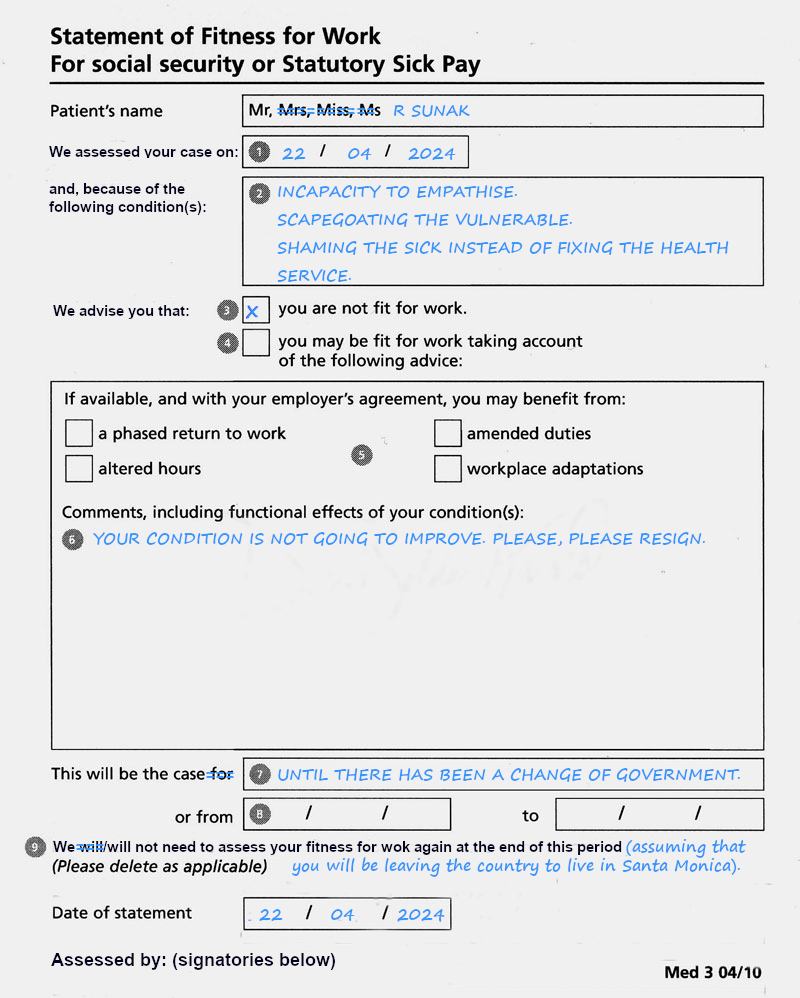The 75th anniversary of the NHS feels like the right time to share Gill’s story.

My friend Gill was a nurse for many years, starting back in her teens, working in youth care and elderly care. She has scars on her arms from being bitten by a dementia patient, and was invalided out of work after a patient threw himself at her and damaged her spine. She was lucky not to be paralysed. She now also has a wasting disease.
She wrote to me in late January after a difficult spell in hospital, with some cancer-like symptoms. The daily news rounds at the time were dominated by stories of the NHS in unprecedented crisis. Patients dying in corridors. Ambulances queuing and missing entire shifts. OAPs lying unattended for hours with broken limbs on their kitchen floors.
Here is what she wrote. Gill has given me permission to share. Please remember this was not intended for publication. I have edited only lightly, for clarity and to respect privacy.
Thank you Dom, I’m home now, hopefully I will stay at home now. I’m on double antibiotics and stronger painkillers, for five days, if I’m no better, I have to go back in. For tests. They think it’s either my bowel or ovary. There’s a lot of bowel cancer in my family. It’s probably a diverticulitis infection. At least I’m not in agony now. They couldn’t find a slot for me to have a CT scan until next week, understandably they keep slots free for people in life threatening circumstances. I have an appointment on 26th unless I’m bad again.
There were two nurses in the surgical assessment unit, where patients were coming back for surgery. They had to wait for two more nurses to come from another ward, to get a paralysed man into bed because they have to have one nurse per limb because they can be sued, if he got hurt. He was so demanding, absolutely horrid to the staff. First it was because there was no ambulance available to take him to his nursing home. He was shouting and calling the nurses callous evil devils. I’ll spare you the bad language.
This young man, another patient, started really shouting at him. He said “You are just so low. These nurses are trying their best to look after us.” He said, “Don’t you watch the news and read papers? People are actually dying from the lack of ambulances.”
The paralysed inpatient patient said, “It’s left wing propaganda! It’s not real. These lefty unions are trying to bring down a democratically elected government.”
The young lad said, “You are witnessing it and you still can’t see it!”
The inpatient seemed to be demanding every few minutes. “Nurse I need a drink.” “Nurse I need my meds.” “Nurse get me a bed now, if I have to stay in this god-forsaken hole.”
Then a man, Len, came in in agony. The nurse was doing his obs, then Mr Inpatient said, “Just because I’m a Conservative you do nothing for me.”
The young lad said, “You sit there and admit you are the cause of this.”
A little later, Len, the really poorly man slumped over and I noticed his breathing had altered, so I went down the ward to the nurse, who was with another patient, and told her. She ran back up the ward to him, called the other nurse and the two of them got him into bed and got him oxygen and called the doctor in.
Mr Impatience started shouting again. “Nurse get me a drink now.” So I got out of bed and poured him a cup of water and took it to him. He said, “At least someone cares, thank you. You should do this job.”
I said, “I did – I was a nurse until I became disabled.”
He said, “Oh so you’re a benefit scrounger are you?”
I felt like throwing the water in his face.
I said to him, “Look, think yourself lucky that you can sit here demanding everything every couple of minutes. The nurses are with that other man [Len] because he’s in a life threatening situation. That’s why I went to get the nurse.”
The young man said to him, “Do you get disability benefit?”
He said, “Yes, I’m entitled. I’m disabled. I’m paralysed.”
He said, “So are a lot of people you describe as scroungers.” He pointed at me – he had seen me pass out twice the night before – and said, “Just because Gill isn’t physically paralysed… you’re not a doctor… how can you call her a scrounger?”
Then something happened. Mr Impatience apologised to me, and for voting Tory.
I said to him, “Can’t you see the nurses have to choose – who is in danger of losing their lives? They have to treat them first.”
He didn’t realise these two nurses were looking after twenty eight of us.
After they got the other two staff, and they got him into bed, he apologised to the nurses too.
He said we had opened his eyes to what was going on. The young lad offered to take him over to the window to see the ambulances queuing. He looked at me and said, “Is it really happening?”
I said, “Sadly it really is.”
One of the nurses said, “It’s heartbreaking. People are dying, who shouldn’t.”
When the sister was checking me out, she said, “Thank you for talking to him. And for probably saving Len, the man with breathing problems.”
I saw my GP. She thinks I may have cancer in my ovary. She said she will refer me to a gynaecologist for an urgent app. I’ve known her for over 20 years. She was very sad, she said in the community, you form a bond with your patients and to see this lottery of care happening, is heartbreaking. She said after all you have done and continue to do for youth care and elderly care in the area. She said, “I will explain what you have done for the community but it could be months until you are seen.”
Sorry for the essay, I got carried away. Stay safe and well – love to you and your family.
Gill’s GP was right. Gill was finally seen in the hospital on June 20th – five months after the above – to investigate her cancer symptoms. She was advised to be ready to stay in if the tests indicated urgent surgery.
Unfortunately, another emergency prevented the consultant seeing Gill, and although Gill underwent the CT and other tests, last time I checked, she was still in the dark as to the results.



